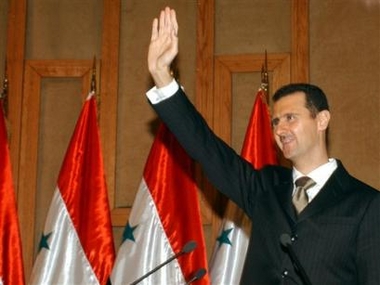 By BARRY SCHWEID, AP Diplomatic Writer, WASHINGTON – Dismissing a qualified offer by Syrian President Bashar Assad to cooperate with a U.N. investigation of the assassination of a former Lebanese prime minister, the State Department on Thursday ruled out setting conditions for the probe.
By BARRY SCHWEID, AP Diplomatic Writer, WASHINGTON – Dismissing a qualified offer by Syrian President Bashar Assad to cooperate with a U.N. investigation of the assassination of a former Lebanese prime minister, the State Department on Thursday ruled out setting conditions for the probe.
If investigator Detlev Mehlis "wants something he should get it, and he should get it without delay and without complication and without obfuscation," said the department’s deputy spokesman, Adam Ereli.Mehlis has accused Syria of refusing to cooperate with his inquiry into the slaying of Rafik Hariri last February in Beirut and concluded it could not have been carried out without the cooperation of senior Syrian officials.
Assad responded Thursday with an offer to cooperate, but warned it would cease if Syria was going to be harmed.The Syrian president also said Mehlis had refused his country’s offer to have Syrian officials questioned on Syrian territory, even in U.N. offices there, or at the Arab League’s office in Cairo.
That decision, and others, are for Mehlis to make, said Ereli, citing a U.N. Security Council resolution as authority.
"It calls for Syria to make individuals requested by the commission fully available to the commission," Ereli said. "And it also gives the commission the authority to determine the location and modalities for the interviews."
Ereli added: "It’s up to the commission to decide what it wants and it’s up to Syria to respond positively to the commission. It’s not up to Syria to negotiate terms."
At the United Nations in New York, U.S. Ambassador John R. Bolton said, "What we want are not speeches or words. We want cooperation, full and complete, and immediate, with Commissioner Mehlis."
En route to the Middle East, Secretary of State Condoleezza Rice dismissed as a stalling tactic an offer by Syria to conduct its own investigation.
"I don’t think this constitutes cooperation," Rice said.
A unanimous vote by the Security Council demanding Syria’s cooperation with U.N. investigators "couldn’t have been clearer," Rice said, adding that Syria is expected to provide whatever the U.N. inquiry requests.
In Paris, French President Jacques Chirac warned Syria it could face sanctions if it refused to cooperate with the investigation.
Ereli called Assad’s speech in Damascus in which he offered limited cooperation "appalling" and "outrageous." He accused Assad of threatening Lebanon even after the U.N. Security Council demanded Syria stop interfering in Lebanon’s affairs.
"The regime of President al-Assad just doesn’t get it and doesn’t understand where the rest of the international community is on this very important issue," Ereli said.
On another matter, the White House on Thursday demanded that Syria release pro-democracy activist Kamal Labwani and stop harassing those who are trying to bring democratic reforms to the Middle Eastern nation.
Human rights groups said Labwani, a physician and founder of the Democratic Liberal Gathering, was arrested Tuesday night upon his arrival at Damascus airport. Labwani had just returned from the United States, where he met with the president’s deputy national security adviser, J.D. Crouch, at the White House.
Presidential press secretary Scott McClellan issued a statement that said the White House is deeply disturbed by reports of Labwani’s arrest.
"We stress that the United States stands with the Syrian people in their desire for freedom and democracy," the statement said. "The Syrian government must cease its harassment of Syrians peacefully seeking to bring democratic reform to their country."
The statement said Bush also calls on Syria to release all political prisoners and specifically named Arif Dalilah, Riad Seif, Mamun al-Homsi, Walid al Bunni, Habib Issa, and Fawaz Tello.
Labwani, 49, already was a political prisoner. He was arrested in 2001 along with nine other activists during a government crackdown on so-called political "salons" — gatherings in private homes during which Syrian intellectuals discussed democratic reforms.
In 2002, he was sentenced to three years in prison on charges that include inciting rebellion, spreading false information and weakening national unity. His sentence included time already spent in prison and he was released in September 2004.
Assad last week pardoned 190 political prisoners. Human rights activists say more than 2,500 political prisoners still are detained in Syria.



